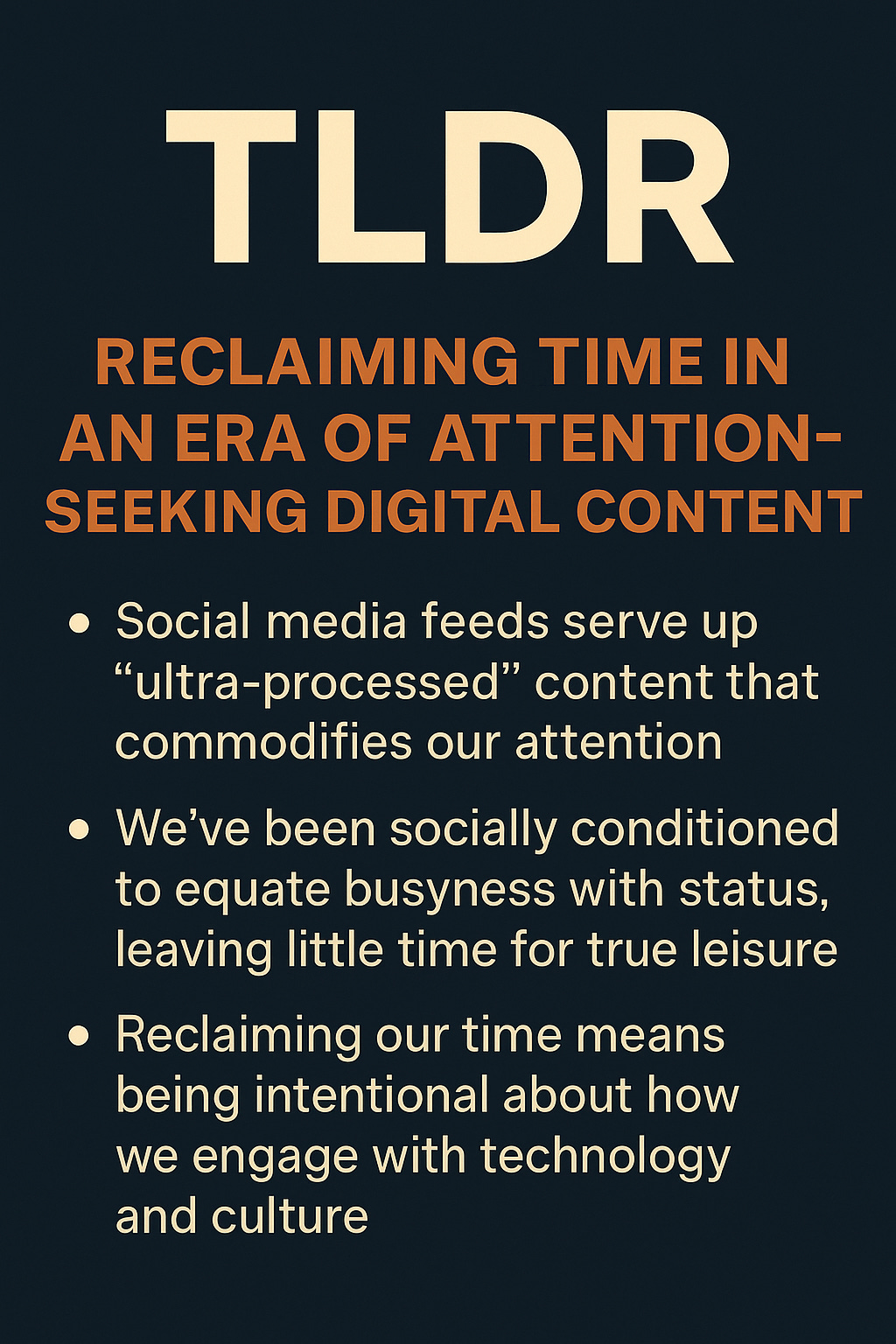Time on Your Hands: Agency, Attention, and Meaning in a Post-Productivity Age
“You must have a lot of time on your hands.”
We hear this often — sometimes in admiration, sometimes in judgment. But beneath the surface of this passing phrase lies a cultural anxiety about time, value, and agency in the age of content saturation. We don’t resent that others have time; we resent the idea that someone might own their time while we feel like we’re always behind. For a lighter version please visit my Medium Post.
This essay is a reflection on that tension: how artificial intelligence, remix culture, and social media haven’t changed time itself, but have amplified and exposed how we use it, monetize it, and often, perform it. In an age where creation is easy and content is endless, the real challenge isn’t how to be productive. It’s how to be meaningful.
The Bazaar of Infinite Content
Today’s internet feels like a marketplace of echoes. On TikTok, Instagram, or Threads, a trend becomes a template: thousands of variations stitched and re-stitched for the algorithm’s approval. Each piece less an original than a remix, designed not to express but to perform.
Cal Newport calls this phenomenon “ultra-processed content” — digital junk food engineered to hijack attention the way a Dorito hijacks taste buds. Just like its culinary counterpart, it’s hyper-palatable, easy to consume, and leaves us feeling vaguely unwell. Newport’s analogy isn’t just clever; it reflects a growing unease that our feeds have become over-optimized and under nourishing.
The platforms themselves incentivize this. As Jaron Lanier describes, social media has transformed into a “behavior modification empire” — nudging users toward more engagement, more outrage, more conformity. These aren’t passive networks; they’re designed systems for shaping behavior at scale.
Zadie Smith echoes this in her critique of social media as a “behavior modification system” that doesn’t just influence what we think, but how we think. When you live inside algorithmic culture, the default becomes mimicry, not originality. You perform relevance, not reflection.
And this performance extends to time.
Busyness as Status, Content as Proof
In a now-famous study, Silvia Bellezza and colleagues found that Americans increasingly equate busyness with status. The more packed your schedule, the more successful you appear. It’s a reversal of older ideals, where leisure signaled wealth. Today, hustle is virtue.
Social media reinforces this shift. Productivity is now content. Screenshots of calendars, humblebrags about burnout, perfectly curated productivity hacks — all become ways of signaling worth.
Jenny Odell, in How to Do Nothing and Saving Time, challenges this mindset head-on. She argues that our concept of time has been colonized by capitalism: we treat it as a resource to be optimized, scheduled, and monetized. The result? Even rest must be productive. Even leisure must look good on camera.
But Odell invites us to imagine another possibility: that time can be “stretchy,” experiential, even inexhaustible. When removed from metrics and markets, time becomes something we can inhabit again.
AI: Amplifier, Not Savior
Into this cultural landscape enters AI — not as a redeemer, but as a magnifier. AI has not given us more time. It has accelerated production, intensified expectations, and expanded the flood of content.
Now anyone can generate a thousand images or articles in seconds. The barrier to entry is gone, but so is the slowness that often makes things meaningful.
Yuri Lopes Pereira describes this shift as the collapse of the “attention economy.” In an age of infinite content, attention becomes devalued by its abundance. We scroll more but retain less. We produce more but connect less.
AI hasn’t created this crisis. But it forces us to confront it.
Agency Over Performance
This brings us back to that offhand comment: “You must have a lot of time on your hands.”
What if having time isn’t a sign of idleness, but of agency?
What if the real flex in 2025 is not being busy, but being free? Free to choose how you spend your attention. Free to say no to the feed. Free to wander, reflect, and make something that doesn’t scale.
Zadie Smith asks, “Who do you want to be modified by, and to what degree?” It’s a profound question for a world that increasingly builds tools to shape us.
Reclaiming agency doesn’t mean rejecting technology. It means using it on our terms, not as instruments of performative productivity, but as tools for intentional action.
The Time-Rich Life
To be time-rich is not to be leisurely. It’s to be sovereign over your attention.
Time, as Jenny Odell writes, is not money. It’s meaning. And in the face of infinite content, AI acceleration, and algorithmic culture, the most subversive thing you can do might be this:
Choose how you spend your hours.
So next time someone says, “You must have a lot of time on your hands,” maybe smile and reply:
“Yes. And I intend to use it well.”



